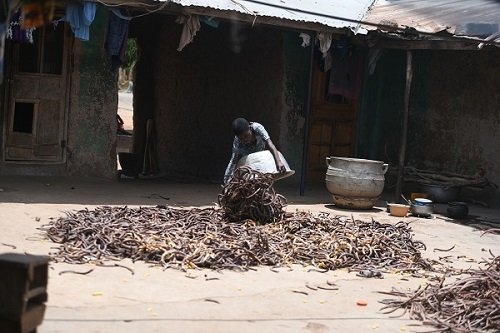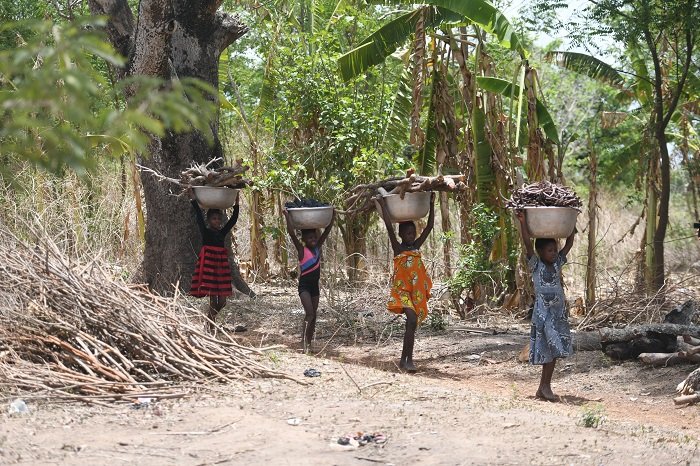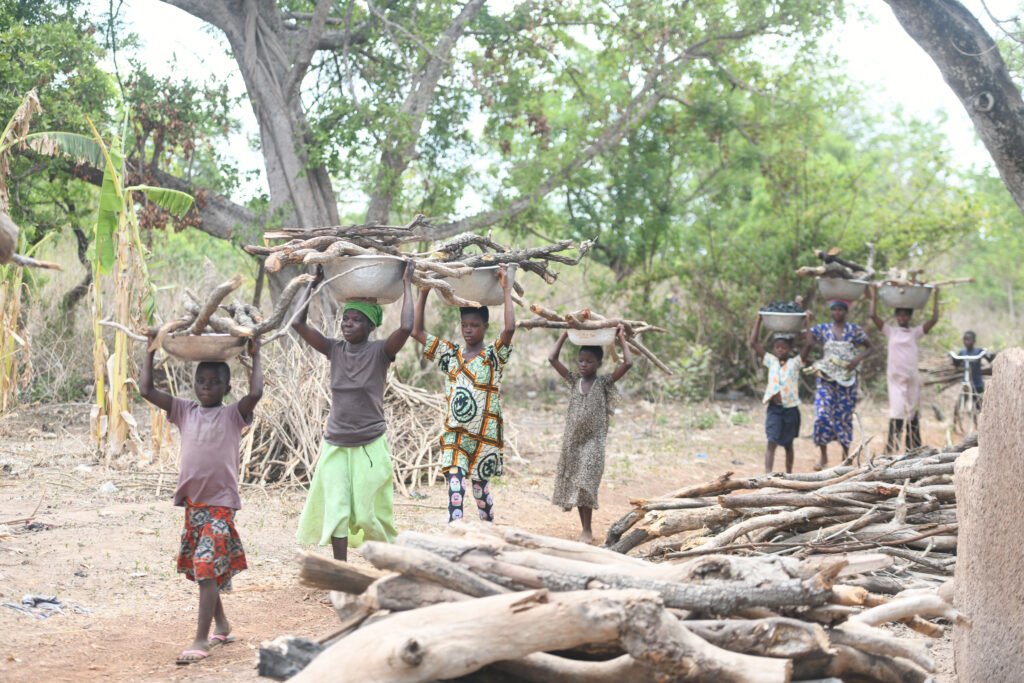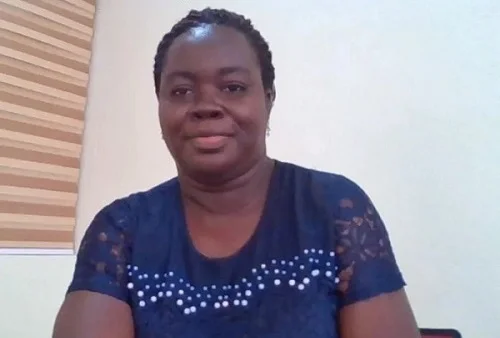Hot!
How can we lessen the burden of these children?

A child pouring dawadawa fruit
Over hundreds of children between seven and 12 years living in Kumdi and its environs in the Kpandai District of the Northern Region are often seen carrying heavy firewood from the bush as a way of supporting their parents to take care of them.


Though seen as a normal obligation by children, some of the parents should be considerate in pushing their children to carry heavy load.
Cynthia, an eight-year-old girl who was photographed among her colleagues confirmed how heavy the load they carry but they have no option.
In an interview with Mr. Solomon Masam, a father of six and a resident of Kumdi he said: “The practice has always been there from time immemorial, so they do not see it as against the right of their children, but rather moulding them to be responsible people when they grow”.


He said that, the children were assisting their parents to cater for them which was not a harmful practice.
He said “In our part of the country, the more you have children the more you become respected and powerful because of the value and support they give us”.
Mr. Enock Bolni a youth advocate and at volunteer in Bimbilla also in the Northern Region said, the practice was very common and had been in existence for decades which would be very difficult to stop.
He said, “Though it is a bad practice, poverty is the underlying factor of the practice, which has led to forced marriages and other unbearable circumstances these children go through.
“The practice has forced many of the children especially girls to travel to seek greener pastures in Southern Ghana, because there, they believe they will make money from their labour as compare with what they do in their communities.
“And until an effective national policy and regulation be implemented to address this situation, it will be difficult to stop the practice”.
Madam Esther Boateng, the Northern Zone Manager of Actionaid Ghana a non-governmental organisation working in the area also said, addressing this problem of using children in farm instead of school needed more collaboration to build the capacities of state institutions to implement measures to identify and protect vulnerable children and victims of the practice.
She said, to implement measures to tackle human trafficking and forced labour, including the worst forms of child labour, it wa`s very important to partner with other institutions to achieve the purpose.
From: Geoffrey Buta, Kumdi
Hot!
Swedru All Blacks back to winning ways, Roshan humble King Faisal

Sekondi Rospak FC made it eight wins in eight successive home games after three second-half goals from John Amoah, Joseph Ntow and Stephen Anthony Kofi. John Amoah opened the scoring in the 55th minute after a barren first half. Joseph Ntow added to the tally in the 56th minute before Stephen Anthony Kofi rounded things up in the 74th minute to give Rospak a 3-0 win over former Premier League side King Faisal.
Elsewhere at Swedru – leaders Swedru All Blacks humbled PAC Academy in an emphatic 2-0 win. Zayat Bubakari scored first for Swedru All Blacks in the 27th minute before Rudolf Junior Nana Kwasi Mensah made it 2-0 in the 34th minute. Swedru All Blacks are top of the table with 36 points – 4 points ahead of second placed Rospak FC.
Meanwhile, Former Premier League side Cape Coast Mysterious Dwarfs recorded their fourth successive home victory after beaten New Edubiase United 2-1 at the Robert Mensah Park. Enoch Odoom struck first for Cape Coast Mysterious Dwarfs in the 19th minute but Steven Asante equalized for New Edubiase United before halftime. After the interval, Godfred Eshun scored from distance in the 65th minute to help Cape Coast Mysterious Dwarfs secure all the points.
Here are the results in Zone Two

Hot!
Cervical Cancer alert: Avoid sex at early age

The Programmes Manager of Non-Communicable Diseases (NCDs) of the Ghana Health Service (GHS), Dr Mary Efua Commeh, has advised young girls to avoid sex at an early age.
This, she explained, will give the cervix the opportunity to mature before they become sexually active.
“You need to delay what we call the first sexual intercourse as much as possible to give the cervix the opportunity to mature before the person becomes sexually active,” she said.
Dr Commeh stated this in an interview with The Spectator in Accra on Tuesday as a part of the Cervical Cancer awareness month.
According to her, cervical cancer was the second leading female cancer in Ghana with a total of about 3,072 cases annually, and out of that, 1,815 deaths are recorded, representing more than 50 per cent.
She indicated that “If young girls are going to be sexually active, then you need to talk to your parents about being vaccinated.”
She explained that vaccinating young girls against human papillomavirus (HPV) has been found to be a very effective way of preventing cervical cancer.
“There are countries that started HPV vaccination years ago and they are not seeing any cervical cancers now because they would have eliminated most of the high-risk HPVs in their women. So if the high-risk HPV is not there, then obviously the results on cervical cancers are going to go down,” she added.
Dr Commmey said the HPV vaccination is recommended for young girls aged nine to 14 years, adding that it had been found to be highly effective, not just for cervical cancers but for other HPV-related cancers, such as anal cancers, cancers of the vagina, genital warts, amongst others.
She further elaborated that the idea is to put up a barrier before the HPV comes in and that once a young female encounters it, she is already protected.
She also mentioned that for cervical cancers, the main cause is called HPV infection, saying generally, all sexually active women acquire HPV at some point in their lives.
However, the Programmes Manager of NCDs at the GHS mentioned that the body has a way of clearing the HPV, explaining that it is a natural mechanism that goes on, unfortunately, there are a few women whose HPV persists.
Moreover, she noted that the numbers for Cervical Cancer tend to be much higher because at times, clients would wait, and try all sorts of medications before they finally report to the health facility saying “we actually lose some women before they get to the hospitals with over 75 per cent of the cases coming in its third and fourth stages.”
Dr Commey, therefore, called for public awareness while ensuring the availability of information for prevention and control.
By Jemima Esinam Kuatsinu







